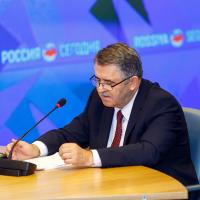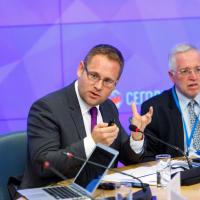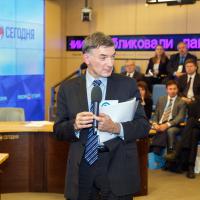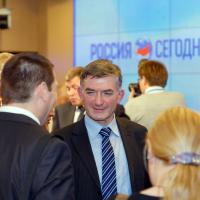The International News Agency “Russia today” has held a media round table “Industry and subject ratings as a measure of global competitiveness of Russian universities”, which was organized by the Ministry of Education and Science of the Russian Federation, the Association “Global universities”, and the project “Social Navigator” of “Russia today”.
The event, dedicated to the discussion of competitiveness of Russian universities, gathered representatives of three parties: experts from the Ministry of Education and Science, compilers of world universities’ rankings and rectors of leading Russian universities – participants of the Project 5-100.
According to the Deputy Minister of Education and Science of the Russian Federation Alexander Povalko, during three years of the Project 5-100 Russian universities have considerably improved their positions. “The leap is very serious; 4 Russian Universities entered the top 100 of world rankings in individual subjects, 6 more universities are in the top 300”.
Alexander Povalko noted positive developments of universities which occurred due to their participation in the Programme to improve competitiveness. The first thing to which the Deputy Minister drew everyone’s attention was the growth of scientific productivity. The second was significantly increased inflow of foreign scientific personnel in universities. And the third was good investments in material base and developed infrastructure of Universities. All this, according to Alexander Povalko, show “that the project develops properly”.
The rector of MEPhI Mikhail Strikhanov considers that success of Russian universities in subject rankings is more important and evident than in the global, because they are “an important tool to increase competitiveness of our universities. They should be considered as an instrument to improve the quality of education, research and University management”.
As for MEPhI, according to the rector the University which was “created and focused on a nuclear direction” is currently aimed at internalization. “Until 2010 our University was closed – we were forbidden to accept foreign professionals and students. However, by 2020 MEPhI plans to increase the number of foreign students up to 20 percent and faculty up to 15 percent”.
“A unique feature of Russian universities is its narrow specialization. We recognize it and are willing to expand coverage from 6 to 24 subject rankings. In addition, we will present a more detailed breakdown of engineering and physical sciences”, the chief editor of the Times Higher Education magazine Phil Baty commented on results of THE subject rank in Physical Sciences, noting that only 3 Russian universities were includes in the top 100 and the National Research Nuclear University MEPhI is the best among them (36th place).
The head of the International Advisory Board of the QS World University Ranking (UK) Martin Ince noted that society paid a special interest in subject ratings; everyone wanted to know which place they had in separate academic disciplines.
However, the ex-leader of projects on higher education of the World Bank (2006-2012) Jamil Salmi admitted that “ratings do not reflect the full picture of universities’ development” and urged the University community to pay attention to benchmarking. He called “internationalization, innovation in the curriculum, uniqueness of programmes and strategic planning” as factors for the success of any University.






















